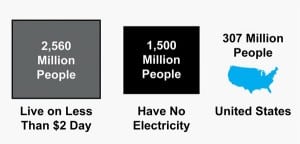In This Issue
-
Smart Grid
"Perfect Citizen" Program to Protect the Power Grid
The National Security Agency is launching a program to protect the grid from cyber attack, along with other civilian and military critical infrastructure, while a new Department of Energy report highlights grid vulnerabilities.
-
Legal & Regulatory
Will Nuclear 2.0 Be Better, Faster, and Cheaper than Nuclear 1.0?
The nuclear renaissance has been in play for several years yet not a shovel of dirt has been turned. Why should anyone believe that Nuclear 2.0 will be an improvement?
-
Smart Grid
Addressing Smart Grid and Consumer Info
As state regulators examine whether the smart grid benefits consumers, a federal agency is looking at what information consumers need to take advantage of the technology.
-
HR
Where HR Meets Legal
Dealing with whistleblowers can be human relations quicksand, where unseen errors that could cost a company millions lay in the path to resolution of employee complaints. Recent legislation makes dealing with whistleblowers an even bigger challenge.
-
Business
India Unveils a Potentially Revolutionary Tablet Computer
Imagine, a tablet computer than can surf the web, run word processing, take and send pictures, and run on sunlight. That’s what the government of India says it can produce…for $35 each. Imagine all the things your organization could do with computers that are essentially commodities.
-
Commentary
The Statistical Connection Between Electricity and Human Development
“Electricity use and gross national product [are] strongly correlated. The relationship…is so important that it should be considered in developing…energy and economic policies [which] seek to lower the real costs of electricity supply,” U.S. National Academy of Sciences, 1986
-
Commentary
How "Framing" Can Bamboozle Regulators
The plurality of regulatory proceedings originate with utilities seeking to improve their profitability. Profitability being part of the public interest, these submissions deserve our attention. But what if these filings are “framed” to divert our attention away from our public interest mission?
-
Commentary
Energy and Water: A Matter of Interdependence
Water resources represent essential inputs into energy production while, at the same time, energy availability is a key factor in effective water resource use.
-
Commentary
Why September Marks the New Year
While the New Year officially begins Jan. 1, in my mind, the year really begins the day after Labor Day. That’s when Washington again takes up its never-ending, seldom-succeeding task of pushing the policy boulder up the hill.
-
Supply Chains
TREND: Solar Doldrums
While the Obama administration in Washington is lauding solar energy as a major part of an alleged transition to renewable energy, the U.S. companies that make solar modules to turn the energy in sunlight into electric power are hurting. Prices for PV cells are falling, and domestic firms are seeing waves of red ink on their books, falling investor interest, and are responding by moving production offshore.


